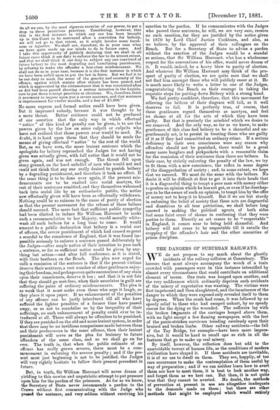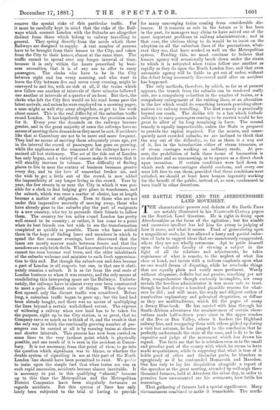THE DANGERS OF SUBURBAN RAILWAYS.
WE do not propose to say much about the ghastly incidents of the railway collision at Canonbury. The horrors that must always accompany the wreck of a train crowded with passengers were in this instance intensified by almost every circumstance that could contribute an additional element of terror. One train was heaped upon another, and the very suddenness which ordinarily deprives such accidents of the misery of expectation was wanting. The victims were first imprisoned and then slaughtered, and the imminence of the danger to which they were exposed only revealed itself to them by degrees. When the crash had come, it was followed by no speedy relief to those who had escaped unhurt, by no speedy rescue for the dying or the wounded. The sufferers lay with the broken fragments of the carriages heaped above them, with no light except a few flaming newspapers, with the feet of the panic-stricken survivors treading carelessly upon their bruised and broken limbs. Other railway accidents—the fall of the Tay Bridge, for example—have been more impres- sive, but it would be hard to recall ope so rich in all the features that go to make up real misery. By itself, however, the reflection does but add to the unavoidable terrors of human life, as the conditions of modern civilisation have shaped it. If these accidents are inevitable, it is of no use to dwell on them. They are, happily, of too rare occurrence to make the contemplation of them useful by way of preparation ; and if we can neither learn how to avert them nor how to meet them, it is best to look another way, and forget them as we best can. But then, it is not quite true that they cannot be averted. No doubt, the methods of prevention at present in use are altogether inadequate to the demands made on them ; but there are other methods that might be employed which would entirely remove the special risks of this particular traffic. For it must be carefully kept in mind that the risks of the Rail- ways which connect London with the Suburbs are altogether distinct from those which belong to railway travelling in general. They spring directly from the needs which these Railways are designed to supply. A vast number of persons have to be brought from their homes to the City, and taken from the City to their homes, almost at the same time. The traffic cannot be spread over any longer interval of time, because it is only within the hours prescribed by busi- ness necessities, that it is of any use to offer to carry passengers. The clerks who have to be in the City between eight and ten every morning, and who want to leave the City between five and seven every evening, might be conveyed to and fro, with no risk at all, if the trains which now follow one another at intervals of three minutes followed one another at intervals of a quarter of an hour. But then, the clerks who left the City first would on his road home pass the latest arrivals, and unless he were employed on a morning paper, a man might as well stay away altogether, as get to his work about sunset. This is the real difficulty of the suburban traffic round London. It has hopelessly outgrown the provision made for it. Every year the demands on the railways become greater, and in the great majority of cases the railways have no means of meeting these demands as they must be met, if accidents like that at Canonbury are not to be more and more frequent. They had no means of meeting them adequately years ago, yet in the interval the crowd of passengers has gone on growing, while the appliances at the command of the railways have re- mained all but stationary. The set of the tide out of London has only begun, and a variety of causes make it certain that it will steadily increase in volume. The difficulty of finding places to live in near the centres of business becomes greater every day, and to the love of somewhat fresher air, and the wish to get a little out of the crowd, is now added the impossibility of any longer living in the crowd. Year by year, the few streets in or near the City in which it was pos- sible for a clerk to find lodging give place to warehouses, and the suburb, which was once a matter of choice, has at length become a matter of obligation. Even to those who are not under this imperative necessity of moving away, those who have already gone to the suburbs play the part of emigrants to a new country, who try to persuade their friends to follow them. The country for ten miles round London has pretty well ceased to be country ; or rather, it has come to a point when its best friends can but wish to see the transformation completed as quickly as possible. Those who have settled there in the hope of finding lanes and meadows in which to spend the fine summer evenings, have discovered that the lanes are mostly narrow roads between fences and that the meadows are only brick-fields. What has ceased to be real coun try cannot too soon become real town, and the older inhabitants of the suburbs welcome and minister to each fresh approxima- tion to this end. But though the suburb can and does become a part of London in all respects but one, in that one it obsti- nately remains a suburb. It is as far from the real seats of London business as when it was country, and the only means of annihilating this interposing space are the Railways. Unfortu- nately, the railways have in almost every case been constructed to meet a quite different state of things. When they were first opened, only the distant traffic was considered. Before long, a suburban traffic began to grow up ; but the land had been already bought, and there was no means of multiplying the lines beyond a certain well-defined extent. The expense of widening a railway when new land has to be taken for the purpose, right up to the City station, is so great, that no Company cares so much as to think of it, and the result is that the only way in which the continually growing number of pas- sengers can be carried at all is by running trains at shorter and shorter intervals. This process has now been carried on some lines to the very farthest point which is physically possible, and one result of it is seen in the accident at Canon- bury. It is not necessary, from this point of view, to go into the question which signalman was to blame, or whether the double system of signalling in use at this part of the North London line should have been permitted to exist. We prefer to insist upon the simple fact that when trains are run in such rapid succession, accidents become almost inevitable. It is necessary to put in this qualifying "almost," because up to this time the Metropolitan and the Metropolitan District Companies have been singularly fortunate as regards accidents. But this system of lines has only lately been subjected to the trial of having to provide
for many converging trains coming from considerable dis- tances. If it remains as safe in the future as it has been in the past, its managers may claim to have solved one of the most important problems in railway administration ; and in that case, the obvious thing to do would be to insist on the adoption on all the suburban lines of the precautions, what- ever they are, that have worked so well on the Metropolitan system. Pending this, we must continue to believe that human agency will occasionally break down under the strain to which it is subjected when trains follow one another ae rapidly as they do upon the North London line, and that even automatic agency will be liable to get out of order, without the defect being necessarily discovered until after an accident has happened.
The only methods, therefore, by which, so far as at present appears, the transit from the suburbs can be rendered really safe, are a compulsory reduction in the number of trains, or a compulsory enlargement of the existing lines, or an alteration in the law which would do something towards providing alter- natives for railway travelling. The first remedy is practically beyond our reach. The dislike felt to a law which forbade railways to carry passengers craving to be carried would be too great to allow of its long remaining in force. The second remedy is equally impracticable, unless the State is prepared to provide the capital required. For the nearer, and conse- quently most crowded suburbs, we are inclined to think that the way out of the difficulty, so far as there is a way out of it, lies in the introduction either of steam tramcars, or of steam carriages working on ordinary roads. At pre- sent, the prohibition of both these forms of locomotion is so absolute and so unreasoning, as to operate as a direct check upon invention. If certain conditions were laid down to which such steam-carriages should conform, and every one were left free to run them, provided that these conditions were satisfied, we should at least have human ingenuity working for the benefit of the public, instead of, as now, condemned to turn itself in other directions.











































 Previous page
Previous page